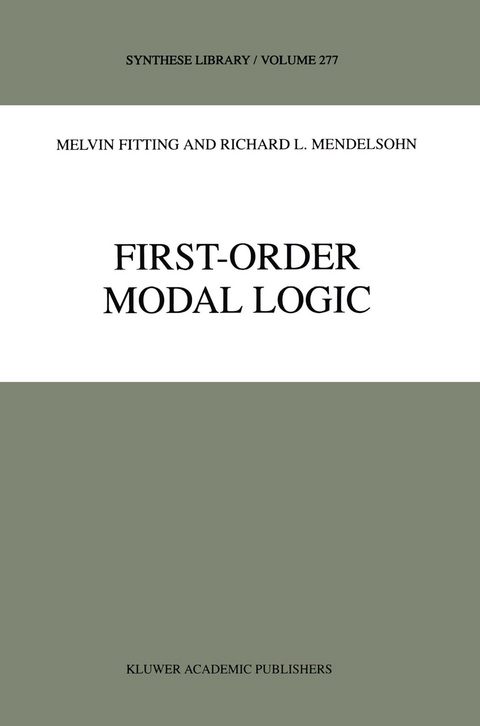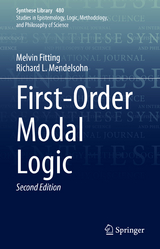
First-Order Modal Logic
Springer (Verlag)
978-0-7923-5335-5 (ISBN)
- Titel erscheint in neuer Auflage
- Artikel merken
The book covers quantification itself, including the difference between actualist and possibilist quantifiers; equality, leading to a treatment of Frege's morning star/evening star puzzle; the notion of existence and the logical problems surrounding it; non-rigid constants and function symbols; predicate abstraction, which abstracts a predicate from a formula, in effect providing a scoping function for constants and function symbols, leading to a clarification of ambiguous readings at the heart of several philosophical problems; the distinction between nonexistence and nondesignation; and definite descriptions, borrowing from both Fregean and Russellian paradigms.
One/Propositional Modal Logic.- 1.1 What is a Modal?.- 1.2 Can There Be a Modal Logic?.- 1.3 What Are The Formulas?.- 1.4 Aristotle’s Modal Square.- 1.5 Informal Interpretations.- 1.6 What Are the Models?.- 1.7 Examples.- 1.8 Some Important Logics.- 1.9 Logical Consequence.- 1.10 Temporal Logic.- 1.11 Epistemic Logic.- 1.12 Historical Highlights.- Two/Tableau Proof Systems.- 2.1 What Is a Proof.- 2.2 Tableaus.- 2.3 More Tableau Systems.- 2.4 Logical Consequence and Tableaus.- 2.5 Tableaus Work.- Three/Axiom Systems.- 3.1 What Is an Axiomatic Proof.- 3.2 More Axiom Systems.- 3.3 Logical Consequence, Axiomatically.- 3.4 Axiom Systems Work Too.- Four/Quantified Modal Logic.- 4.1 First-Order Formulas.- 4.2 An Informal Introduction.- 4.3 Necessity De Re and De Dicto.- 4.4 Is Quantified Modal Logic Possible?.- 4.5 What the Quantifiers Quantify Over.- 4.6 Constant Domain Models.- 4.7 Varying Domain Models.- 4.8 Different Media, Same Message.- 4.9 Barcan and Converse Barcan Formulas.- Five/First-Order Tableaus.- 5.1 Constant Domain Tableaus.- 5.2 Varying Domain Tableaus.- 5.3 Tableaus Still Work.- Six/First-Order Axiom Systems.- 6.1 A Classical First-Order Axiom System.- 6.2 Varying Domain Modal Axiom Systems.- 6.3 Constant Domain Systems.- 6.4 Miscellany.- Seven/Equality.- 7.1 Classical Background.- 7.2 Frege’s Puzzle.- 7.3 The Indiscernibility of Identicals.- 7.4 The Formal Details.- 7.5 Tableau Equality Rules.- 7.6 Tableau Soundness and Completeness.- 7.7 An Example.- Eight/Existence and Actualist Quantification.- 8.1 To Be.- 8.2 Tableau Proofs.- 8.3 The Paradox of NonBeing.- 8.4 Deflationists.- 8.5 Parmenides’ Principle.- 8.6 Inflationists.- 8.7 Unactualized Possibles.- 8.8 Barcan and Converse Barcan, Again.- 8.9 Using Validities in Tableaus.- 8.10 On Symmetry.-Nine/Terms and Predicate Abstraction.- 9.1 Why constants should not be constant.- 9.2 Scope.- 9.3 Predicate Abstraction.- 9.4 Abstraction in the Concrete.- 9.5 Reading Predicate Abstracts.- Ten/Abstraction Continued.- 10.1 Equality.- 10.2 Rigidity.- 10.3 A Dynamic Logic Example.- 10.4 Rigid Designators.- 10.5 Existence.- 10.6 Tableau Rules, Varying Domain.- 10.7 Tableau Rules, Constant Domain.- Eleven/Designation.- 11.1 The Formal Machinery.- 11.2 Designation and Existence.- 11.3 Existence and Designation.- 11.4 Fiction.- 11.5 Tableau Rules.- Twelve/Definite Descriptions.- 12.1 Notation.- 12.2 Two Theories of Descriptions.- 12.3 The Semantics of Definite Descriptions.- 12.4 Some Examples.- 12.5 Hintikka’s Schema and Variations.- 12.6 Varying Domain Tableaus.- 12.7 Russell’s Approach.- 12.8 Possibilist Quantifiers.- References.
| Reihe/Serie | Synthese Library ; 277 |
|---|---|
| Zusatzinfo | XII, 292 p. |
| Verlagsort | Dordrecht |
| Sprache | englisch |
| Maße | 160 x 240 mm |
| Themenwelt | Geisteswissenschaften ► Philosophie ► Allgemeines / Lexika |
| Geisteswissenschaften ► Philosophie ► Logik | |
| Geisteswissenschaften ► Sprach- / Literaturwissenschaft ► Sprachwissenschaft | |
| Mathematik / Informatik ► Mathematik ► Logik / Mengenlehre | |
| ISBN-10 | 0-7923-5335-8 / 0792353358 |
| ISBN-13 | 978-0-7923-5335-5 / 9780792353355 |
| Zustand | Neuware |
| Haben Sie eine Frage zum Produkt? |
aus dem Bereich



